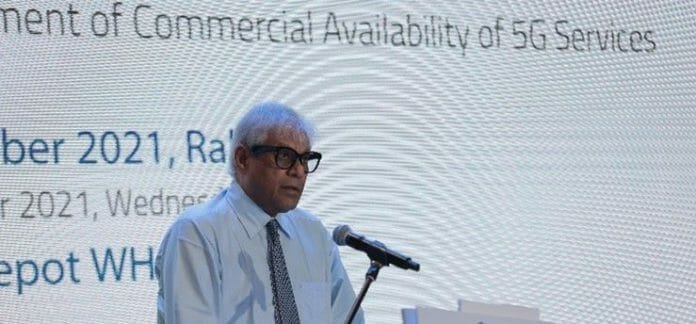DNB CEO, Ralph Marshall issues a long statement replying to queries put across by Opposition MP Ong Kian Ming on some key areas with regards to the government’s appointment of a single entity to roll out 5G in the national.
Kian Ming raised on its monopoly, the worry of the telco’s on pricing, loss of revenue from spectrum auction the dangers of one party managing the nation’s lifeline.
In response, Ralph Marshall says the primary motivation for the Government in opting for a 5G single wholesale network (SWN) approach to implement 5G nationwide is as follows is among other is to address the poor internet connectivity available in Malaysia, particularly in the suburban and rural areas where even 4G coverage and quality is marginal at best.
To remove the need for mobile network operators to invest heavily in 5G networks and to permit them to focus on the improvement required of their existing 4G and fiber networks under the JENDELA plan and ensure that all players – existing and new ones – have fair and equal access to the 5G network and its capacity.
He added it is also to position communications as a utility and pass on cost savings to end-users, while making it easier for them to take up 5G services. Existing telco operators have shown that it is not in their DNA to embrace a cost-recovery model to roll out 5G infrastructure and pass on savings to end uTo accelerate Malaysia’s launch of 5G and to catch up quickly with its near neighbours who are presently ahead in 5G roll out. This is not about ranking among our neighbours but about having better infrastructure and being competitively placed to attract foreign direct investment.
“If it is accepted that these are important policy objectives, then it cannot be left to the private sector to implement at its pace, driven by profit motivations”
On the proposal by PH, Ralph said, “it must not be forgotten that the Pakatan Harapan proposal which was in substance reiterated in the National 5G Task Force Report and the Malaysian Communications and Multimedia Commission’s (MCMC) “Final Report on Allocation of Spectrum Bands for Mobile Broadband Service in Malaysia” published at end-2019 was inordinately delayed in its implementation as a result of posturing by the proposed consortium members. There was no urgency in the MNOs to implement 5G as they were content to further sweat the 4G network that they owned and were making substantial returns from. Malaysia continued to slip behind its ASEAN neighbours in 5G rollout with its attendant adverse consequences to foreign direct investment (FDI) that relies on telecommunication infrastructure and gross domestic product (GDP) growth in Malaysia.”
Drawing parallel to Petronas, Ralph cites in much the same way that Malaysia’s petroleum and gas reserves (a limited and national resource) were not sold off to the highest bidder but vested in Petronas to exploit for the benefit of the nation and Rakyat, 5G spectrum is a limited national resource that must be utilised in the most efficient manner for the benefit of the nation and the Rakyat.
The 5G network requires more spectrum and in broader bands than 4G, and said that is only going to increase over time. It is undisputed that the Multi Operator Core Network (MOCN) model adopted by Digital Nasional Berhad (DNB) is the most efficient way to use the spectrum allocated for the 5G network. It is important to also note that the Government did not ever auction spectrum for use by MNOs for 2G, 3G, and 4G, and many of the MNOs were given spectrum assignments for nominal payments which benefit was not passed through to the consumers, as is apparent by the charges for these services when compared with charges by operators in countries where spectrum was bought by operators in government auctions.
Much has been said about the SWN being a monopoly and not conducive for competition. This comes from a misunderstanding of how the SWN works. The Radio Access Network (RAN) which comprises the radio equipment for the 5G network is used by DNB to deliver wholesale capacity and coverage to all MNOs, MVNOs, and other wholesale operators. These parties can then package the 5G services in any way they choose and there can therefore be intense competition in the provision of 5G services to end-users. The ability to have network slicing in the 5G network further enhances the ability of MNOs and MVNOs to provide bespoke solutions to enterprises, again enhancing competition. For example, in the UK, the best innovations in 5G have consistently come from new players and not the incumbent telco operators.
On the potential that DNB has the risk of a single point of failure as an SWN, in this regard, he said DNB has adopted a “no single point of failure design” where there are redundancies built-in, in accordance with global standards. DNB has designed and is implementing a fit-for-purpose 5G network with a modular and flexible architecture, end-to-end security, and resilience, and the network is monitored round the clock. In addition, as DNB’s 5G network is integrated into existing MNO’s 4G networks, where customers would immediately and automatically fall back to the existing 4G network, as they do when they are not in 5G coverage area. As such there would be no loss of connectivity.
Concerning pricing, DNB says its totally transparent in its pricing for the provision of 5G capacity and coverage. The detailed business plan utilising a cost-recovery model is scrutinised by MCMC and the pricing must be approved by MCMC. DNB must publish its standard pricing and non-price terms for the provision of 5G services to any access seeker. It is absolutely incorrect to allege that DNB has the opportunity to make monopolistic profits.
TIt says the case for an SWN is very strong. Whether it should be owned by the Government or a consortium of MNOs is secondary. The Government’s preference was for a neutral party to implement the SWN so that there will be no conflict of interest that will affect the timing and extent of the rollout of the 5G network as the consortium members also own the retail network.
On why a second SWM is not practical, DNB says there will be enormous implications should the Government decide on having a dual wholesale network (DWN). It is highly unlikely that DNB in its current form will survive, should there be another wholesale network provider. With the failure of DNB, the second wholesale provider will then eventually become a private SWN monopoly. There are also financial, legal, and reputational implications for the country and the Government should DNB be discontinued. Firstly, Government will be subjected to pay substantial amounts of claims and compensation, including early termination penalties of various types of contracts, for the entire operations of DNB. Furthermore, the reversal of the SWN decision will have a serious impact on the credibility of the Government and the inflow of FDI especially investments in the high-impact technology sector.
Ralph acknowledges that a 100% Government-owned entity may be less efficient in the long term. As such, he says DNB has always proposed, which is known to senior officials and management of MNOs, that the Government is open to reducing its stake in 3 years after 5G is rolled out so that MNOs can become shareholders of DNB. It is not practical to open the ownership now as DNB has adopted a cost recovery and supply-led approach to accelerate the implementation of 5G network at a lower cost, with a specific focus on narrowing the urban-rural digital divide as intended by the Government.










